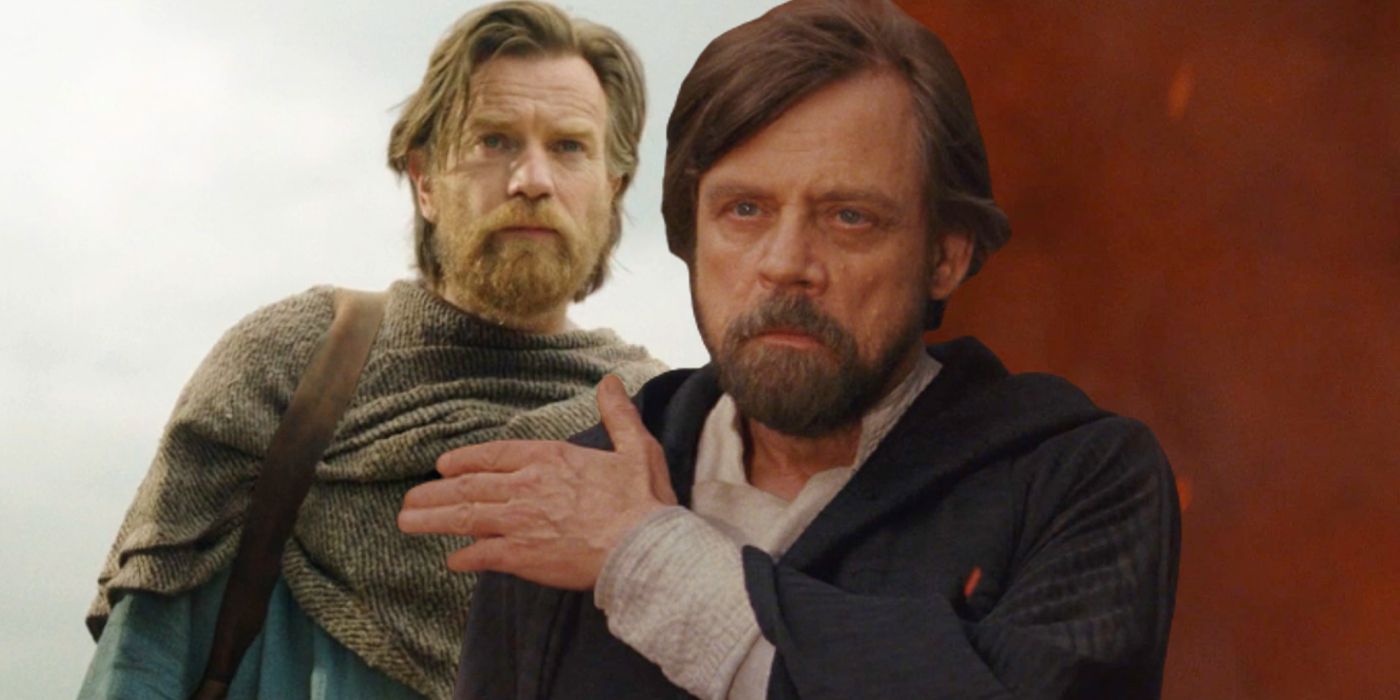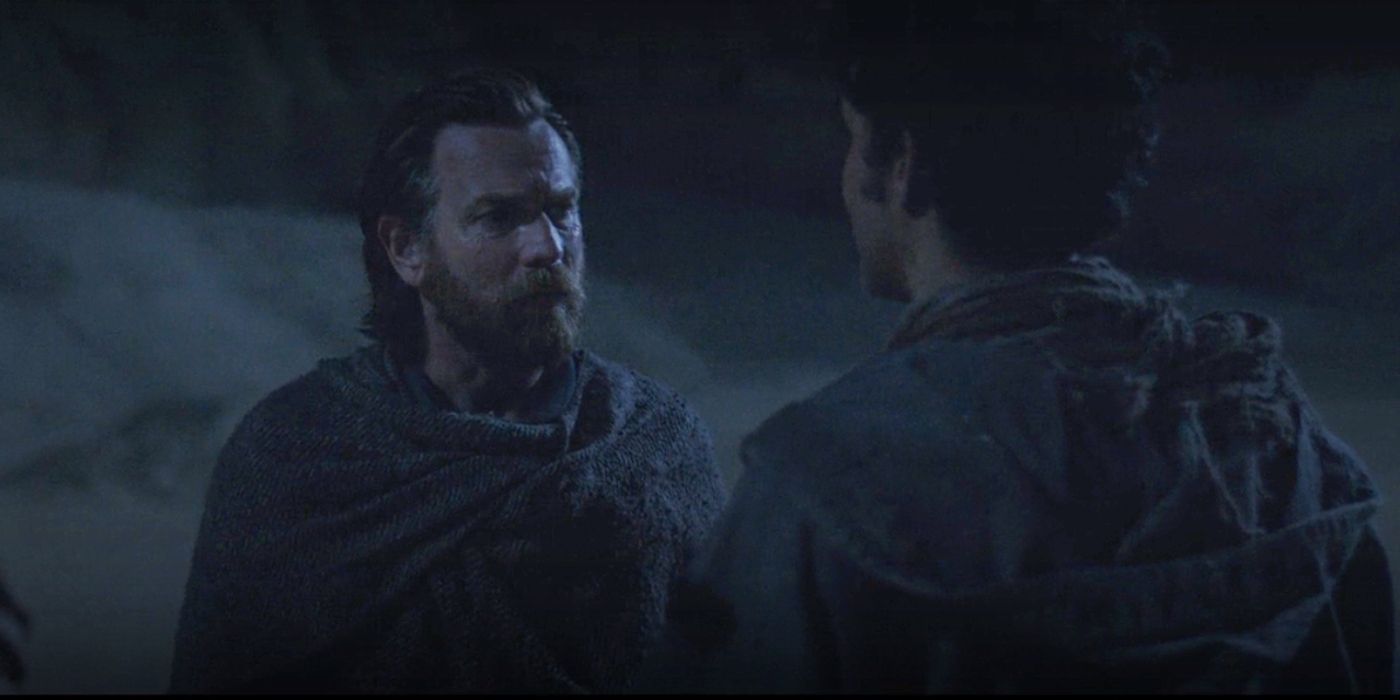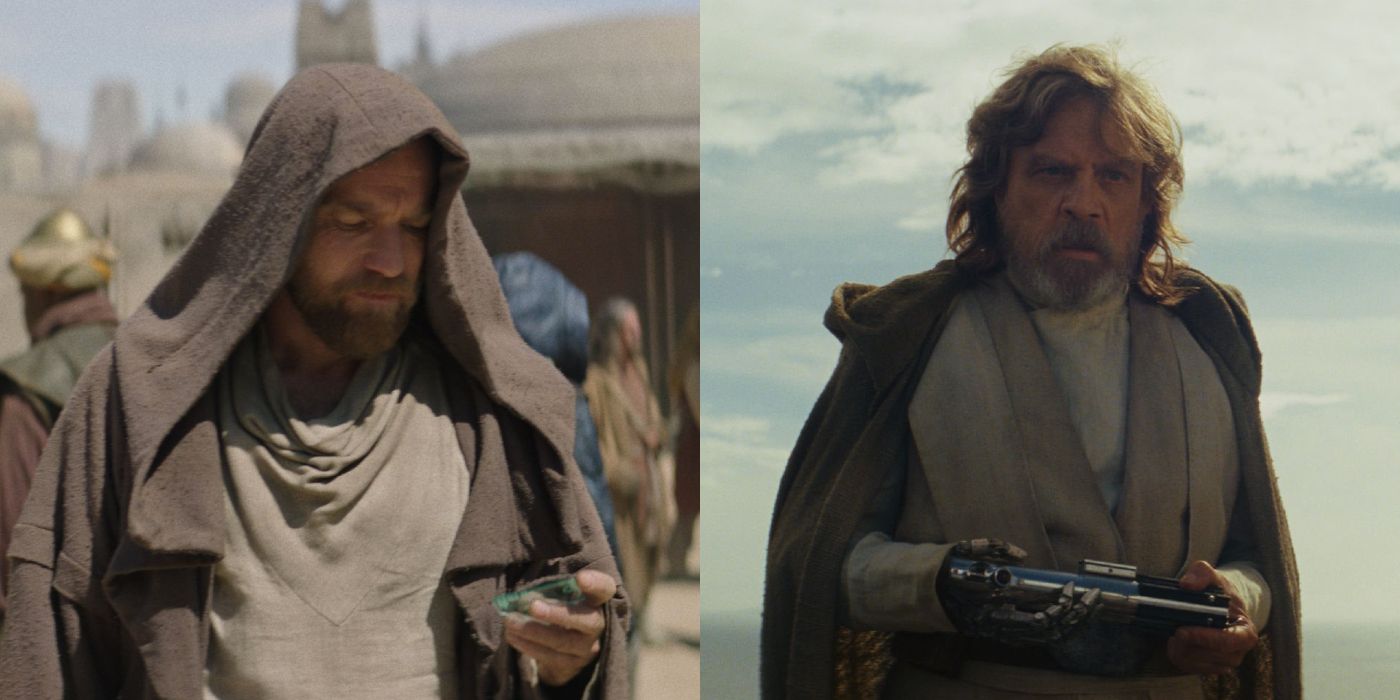Warning: Contains SPOILERS for Obi-Wan Kenobi episodes 1 and 2.
The story of Obi-Wan Kenobi episode 1 serves as an unexpected mirror to Star Wars: The Last Jedi and Luke Skywalker's controversial arc, showing just how good it really is. Obi-Wan Kenobi's place in Star Wars' timeline is a fascinating one; set 10 years after Star Wars: Episode III - Revenge of the Sith and nine years before Star Wars: A New Hope, it's positioned as a perfect midpoint between the prequel and original trilogies. That means it can inform and change perceptions of both, deepening relationships and rivalries that were explored in the former while also explaining more aspects of the latter.
In Obi-Wan Kenobi episodes 1 and 2, the run the full gamut of major Star Wars characters, from the returning presence of Darth Vader (Hayden Christensen) to how Obi-Wan Kenobi (Ewan McGregor) looks out for both Luke Skywalker (Grant Feely) and Leia Organa (Vivien Lyra Blair). These were all, to varying degrees, expected from the show, and in some ways a part of its purpose. Less anticipated was for Obi-Wan Kenobi to have an impact upon the sequel trilogy, given it's so far off in the timeline, and yet the opening episodes do just that.
Some of these ways are smaller - for instance, one of Obi-Wan episode 1's best Easter eggs is the reveal that Kenobi has two lightsabers buried on Tatooine, something Rey will do many years later - but there are bigger, more thematic parallels at play too. This particularly goes for Obi-Wan's arc and how it connects to the later life of the person he has sworn to protect: Luke. Luke's story in The Last Jedi was divisive and unexpected, but Obi-Wan Kenobi shows it fits Star Wars even better than realized.
Obi-Wan In Kenobi Show Mirrors The Last Jedi's Luke Skywalker
An aged Jedi Master lives exiled in a remote corner of the galaxy where (they think) no one else will tread. Once a bright spark of optimism, the years and past failures - especially of their former student - weigh heavily upon them and extinguished some of that light. This isn’t the same great hero of a previous Star Wars trilogy, but someone visibly older, in some ways wiser, and certainly wearier. Despite great power, it’s clear he’s not used the Force in years. With a seven word phrase, he declares the old Order is finished. Words that could define Luke Skywalker in Star Wars: The Last Jedi also, somewhat surprising, seem to perfectly fit Obi-Wan Kenobi’s eponymous character.
“The time of the Jedi is over.” Obi-Wan’s startling phrase to Nari, an Order 66 survivor who runs out of time and into the Empire in Obi-Wan Kenobi episode 1, is a poignant reflection of just how much he has lost, of how much pain and suffering he has been through and how, in the decade since Star Wars: Episode III - Revenge of the Sith, the Empire has asserted its galactic might, snuffing out even the tiniest flickers of hope. It’s made all the more fascinating, though, by its parallels to Luke in The Last Jedi, who declared “it’s time for the Jedi to end,” something that the Star Wars show was surely aware of given just how much controversy that arc caused for Lucasfilm.
Obi-Wan Kenobi Makes The Last Jedi's Luke Even Better
Star Wars: The Last Jedi's Luke Skywalker was controversial for several reasons, but one of the biggest sticking points was the idea that it was out of character for him; that Luke turning against Ben Solo (Adam Driver), and then abandoning the Force and the people he cares about, was unthinkable. That never quite held true, despite being an understandable response given just how drastic a change it was, because people do develop over time and characters can't be expected to just remain the same, especially in the face of such great failures. Hope and despair are twin pillars of Star Wars, and the latter has to be fully explored for the former to hold more weight and be truly earned. That happened in Star Wars: The Last Jedi, and it's similar to what plays out in Obi-Wan Kenobi; the great Jedi Master has lost hope and fallen into a pit of despair, only to be pulled out because of the slightest glimmers of a brighter future.
Knowing that Obi-Wan Kenobi, once an all-powerful Jedi, went through something similar to Luke, whom he trained, makes both of their arcs even stronger and further connects the pair. That they each suffered such feelings of loss, of hopelessness, and despair, and yet when the time came they ultimately found the strength needed to rejoin the fight and save the day one last time, makes their heroics even more impressive. That they could find such strength despite the great adversity they faced shows their resolve, their true character, and deepens what Star Wars: The Last Jedi was doing. This was individual to Luke, but he wasn't the only Jedi to face these difficulties, nor the only one to respond in such a way (it's like poetry, it rhymes...).
Luke, Obi-Wan, and even Yoda went into exile after their worst failures; for their own safety, yes, but to protect others and because of the shame felt from their own failings, which is an incredibly natural response. It better highlights not only the power of the dark side, and thus the even greater power of the light to come back, but even more so the impact of grief, be it a specific loved one or the entire Order. That they each returned, in their own ways, to help the Jedi Order and the galaxy once more is the true sign of their Jedi strengths, their connection to the Force, and their sheer goodness, which shines through at the end of The Last Jedi and in Obi-Wan Kenobi's opening episodes.
Obi-Wan Kenobi releases new episodes Wednesdays on Disney+.
Want more Obi-Wan Kenobi articles? Check out our essential content below...
- Obi-Wan Kenobi Cast Guide: Every New & Returning Star Wars Character
- Obi-Wan Kenobi Episode 1 Easter Eggs & Star Wars References Explained
- Obi-Wan Kenobi Episode 2 Ending Explained: Where Is [SPOILER]?
- Obi-Wan Kenobi Episode 2's Veteran Cameo Explained
- Is That Hayden Christensen Playing Darth Vader In Obi-Wan Episode 2?
- Why Obi-Wan Can’t Talk To Qui-Gon Jinn's Force Ghost



